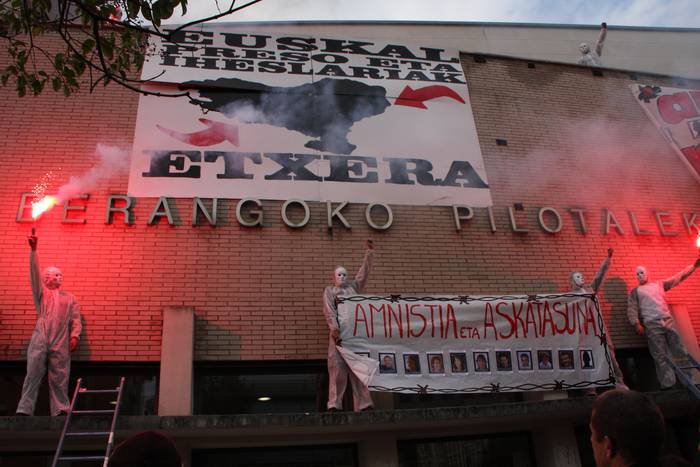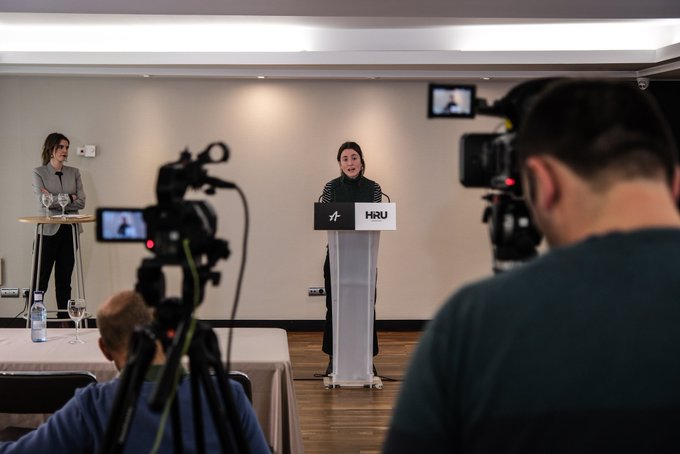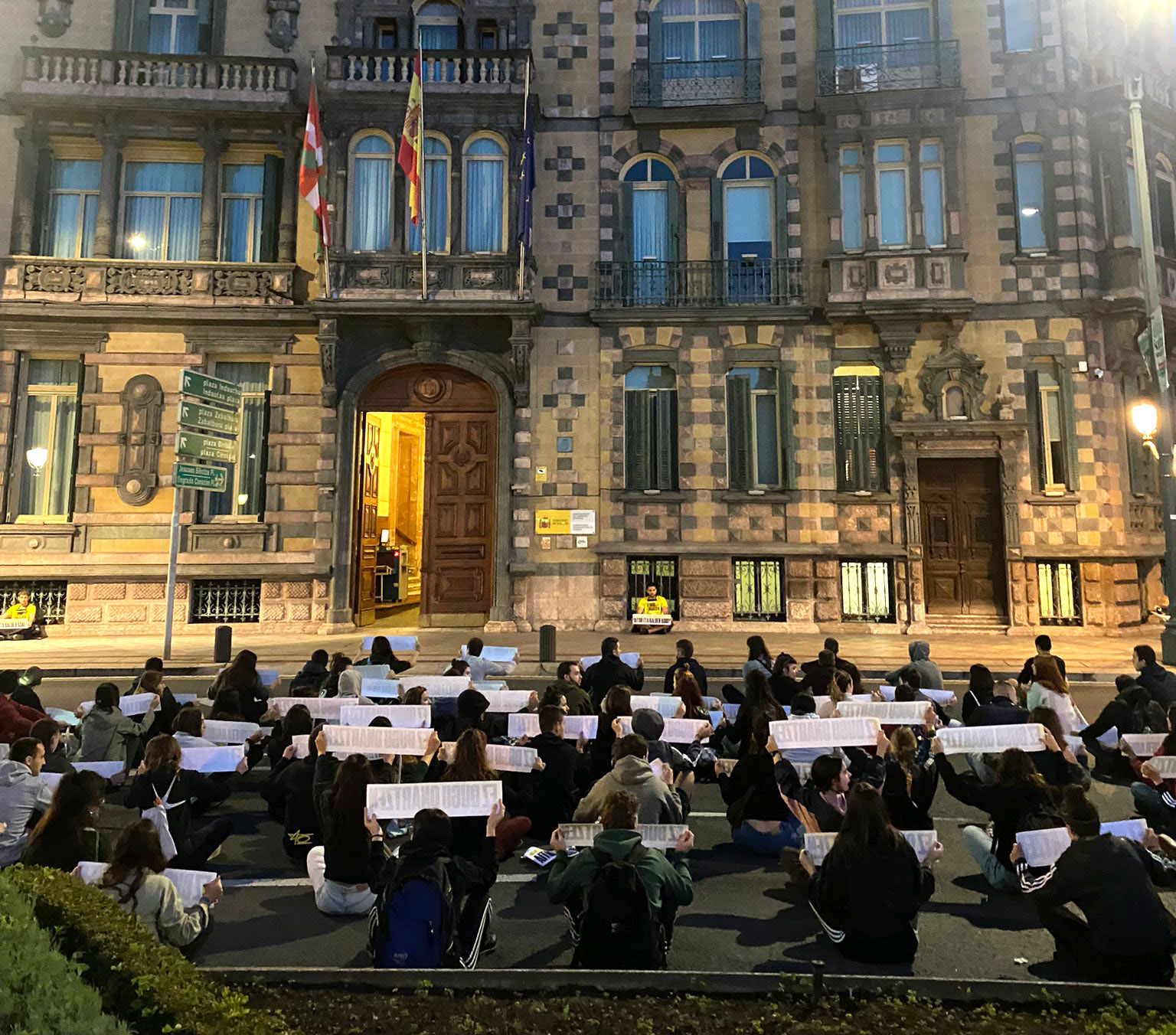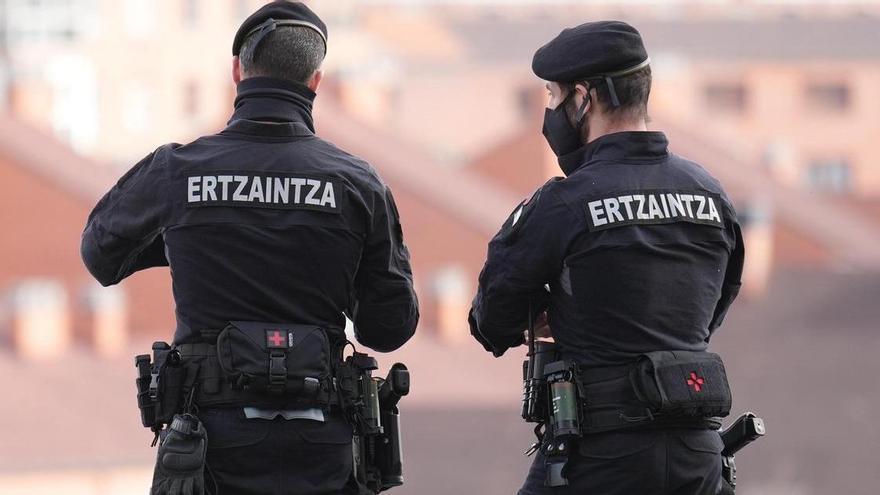Tapia Law: Government more power, municipalities less
- In this legislature, the Basque Government has pushed for two changes that profoundly affect the governance model. On December 9, the Basque Parliament approved the Environmental Administration Act, eliminating municipalities and handing over to the government the decision on projects of “maximum public interest”. The second step still has a long way to go, but the Government ' s intention is to recognize this character to projects driven by private and non-environmental enterprises. We want to analyse both the nature of these important changes and the forms of approval that have been used. We have talked to María Eugenia Arrizabalaga of the PNV and Mikel Otero of EH Bildu, who have highlighted in parliamentary debates in favour and against change respectively.

Both legislative changes have been promoted by the Department of Economic Development, Sustainability and the Environment, headed by Arantxa Tapia. In January 2021, he presented to Parliament the draft Environmental Administration Act. Half a year later, in June, the vapours from the Zaldibar landfill, 106 amendments from PNV and PSE to the law, still hot. Amendment 61 required the amendment of a new law – the Land Management Act – to create the category of Projects of Maximum Public Interest (PGIP). The SMICs must be “public promotion” and environmental, they are above the general urban planning plans of the municipalities (PGOU), and it is up to the government to give that name to a project. Arantxa Tapia has carried out a passionate defense of emendakina, which has been called Tapia Lege. It considers it necessary that “the Basque Government has a mechanism that can overcome the municipal approach”. The PNV and the PSE used an absolute majority to pass the law, all the opposition voted against.
Amendment 61
Parliamentarian and member of the Euzkadi Buru Batzar, María Eugenia Arrizabalaga Olaizola, attributed to EH Bildu the responsibility for the “bustle” created around Amendment 61: “Some prefer to oppose the solution.” It has linked the creation of the PGP to the objectives of the Government’s environmental policy, recalling that by 2030 40% of the energy consumed must be “sustainable”. Is the decision related to the Zaldibar landfill? "We have a serious problem, even if Zaldibar, the industrial waste problem, had not happened. We are an industrial people, and that must be managed. There are few landfills left and in the short term there will be insufficient space to meet the needs. That is the primary motivation of the IPGP.”
"The government needs to have
a mechanism that can overcome the municipal
approach" Arantxa Tapia
EH Bildu parliamentarian Mikel Otero Gabirondo has spoken strongly against the measure. Distinguishes Areas A and B. Zone A would be the public reasons given: Problems with waste management infrastructure. Tapia refers to landfills, sewage treatment plants and the like.” Difference B would be of other interest not recognised: “It is about leaving the way open for the Government to impose projects of a very diverse nature above the resistance of the municipalities.” Proof of these resistance is the withdrawal of the gas extraction plan in Vitoria or the landfill project in Azkoitia and Lezama.El procedure to grant the IPGP to a project is “great guarantee”, according
to Arrizabalaga: “We have to present a lot of documentation, comply with the environmental conditions, give a hearing to the municipality to give its vision...” Otero thinks otherwise: “They say “don’t worry, then all legal guarantees will be required”: joint environmental authorizations... Does that give guarantees? Some do. But does Petronor have permission? Incinerators from Gipuzkoa and Bizkaia? Paper factories? Yes. The law does not guarantee that it is not harmful to the environment or health.”
Even before the Tapia Act, the Government had resources for spatial planning and infrastructure beyond municipal competence: Partial Territorial Plans and Sectoral Territorial Plans. In Otero’s view, sufficient tools “to make reasonable planning without reaching these extreme legislative changes”. Arrizabalaga “laughs” to defend from EH Bildu the sectoral planning, “as if they had avoided conflicts”. Recalls the Sectoral Territorial Wind Energy Plan, adopted in the early 2000s: “Has this cured some opposing attitudes? No.”
.jpg)
Amendment Vs legal modification
To create the WFP category, the Government has amended the Land Management Act by amending the Environmental Management Act. As such a substantial step, it seems more natural to present directly the amendment of the Land Management Act or the new law. The differences are important: the procedure for adopting the amendments is shorter and the debate is limited to the parliamentarians of the relevant report, until it is put to the vote in plenary, a change of law requires more time, Eudel should draw up a law valuation report or can invite experts and agents to the committee by the political groups.
“The bill comes from the previous legislature. In the renewal of the Government, it was decided to initiate parliamentary proceedings as soon as possible. Subsequently, each group submitted its amendments without further ado,” explains Arrizabalaga the amendment and not the reason for the submission of the legal modification.
Eudel and President Gorka Uraran
Another important consequence has been the route of the amendment. The Law on Local Institutions of the Basque Country states that Eudel must study any law affecting municipal competences before its approval. Eudel did so with the Environmental Management Act when in January the department of Arantxa Tapia presented the preliminary draft and did not object. However, the PNV-PSE tabled the amendments in June. Dozens of mayors from Elkarrekin A-IU and EH Bildu publicly requested Eudel to prepare a new report to analyse Amendment 61, as well as several municipalities. Otero says that the Mayor of Azpeitia, Nagore Alkorta, did the same in the Eudel executive, “three times, but the majority PNV-PSE did not accept it” (PNV President Gorka Uraran, and the vice-presidents of EH Bildu, Nagore Alkorta and José Antonio Santano).
“The law says every bill has to go through Eudel to issue the report. And that has been done. It does not say that the amendments have to pass,” says Arrizabalaga. Although the law does not oblige it, is it not logical for Eudel to undertake a renewed study? “We claim the legitimacy of the parliamentary people’s delegation, as in this case in all others.” Otero has acknowledged that the “formal step” has been accomplished, “but I attach more importance to the government’s trap.”
"The government has seen
the right time to strike the governance model"
Mikel Otero
“The president of Eudel has reiterated that the law does not contradict municipal competences,” Arrizabalaga said. “After the debate that has generated in the municipalities there is a theater of political interest,” said Uraran in January in the Faktoria program of the Basque Country Irratia. In March, however, Eudel has produced a report analysing the draft Energy Transition and Climate Change Act which proposes its extension in the WFP. In addition to the preliminary draft, the report analyses the creation of the PGP in general, with a very critical assessment: He questions the “justification and legitimization” of the PGIP; indicates that the measure may be contrary to the Spanish Constitution; that the territorial and urban planning “denaturalizes and delegitimizes”; that with the PDI the projects can be “imposed” on the municipalities; that the PGIP should be exceptional and that there is a risk of generalization; that a project cannot be declared like this because “government approves it”. [More complete summary of the Eudel report here]. Arantxa Tapia has criticized Eudel's reading, emphasizing that municipalities are asked "three times" for their opinion, and considers that it can be unconstitutional as "excessive". In April the municipal authority has turned 40: “Eudel has praised interinstitutional collaboration,” you can read on the website of the association the anniversary celebration event. Despite this, a law that directly affects municipal competences has been passed without hearing the word of the municipalities, with the approval of the entity that supposedly represents its interests and the active impulse of its president.
.jpg)
And the PSE?
Alberto Alonso Martín defended in parliament the PSE’s vote in favour of the Tapia Law. He suggested diffusely that, although he did not like it, the PSE “prioritized the balance necessary to maintain the coalition government.” The attitude of José Antonio Santano can be an example of this difficult balance. As mayor of Irun, Eudel voted in favour of the motion calling for the study of the Tapia Law “because it directly affects the competences of municipalities and local autonomy”. As a member of Eudel's executive, the entity avoided this same study in tune with Gorka Uraran.
“It seems that the PSE did not like it, but voted in favour,” says Otero. Arrizabalaga totally denies that the law has raised problems among coalition government members: “Nothing, there was consensus from the beginning.” As for the next step, he says the agreement is total, “no doubt.”
Tapia 2.0 Law
Arantxa Tapia signed the draft Energy Transition and Climate Change Act in November 2021. The preliminary draft proposes the amendment of the Tapia Law. Currently, the PIP should promote “public initiatives”, now it is intended that the promoter may be “public and/or private initiatives”. Currently, PIPs should be “public utility facilities and environmental social interest” and are now intended to be “other types of projects”. In short, two changes that would be very profound: opening the door to private promotion and projects that are not related to the environment. It draws attention, incidentally, to the fact that it is intended to give way to projects not related to the environment through the law that bears that name.
Arrizabalaga considers the change appropriate and considers that the tool can be “effective”. “Why also those promoted by private companies? For example, of the approximately ten landfills in the Basque Country, only two or three are public. Why not for non-environmental things? We're going to a hospital." He stresses, however, that “the public and social interest must always be justified”: “PGP cannot be established on the basis of personal whims, those who say of Tapia seem to me to be absolutely unfair”.
"It has a floor, but the political story created has pulled things out of its
hand" María Eugenia Arrizabalaga
In the opinion of Otero, it has been demonstrated that between zones A and B mentioned at the beginning of the report “Difference B is more important: we are tired of paralyzing the different plans of the Government from the municipalities and we will develop a tool to prevent it”. Ensures that the public interest or need is not justified: “Justifying it from a department is very simple, Tapia specializes in it: TAV is beneficial to the environment because less CO2 is released than by plane to Madrid. Corrugated, is it urgent? Jobs will be created and job creation is urgent for the
government.” Arantxa Tapia signed the draft Energy Transition Act on 26 November 2021. That is to say, when the first version of the Tapia Act was debated and voted in Parliament in December, the extension of the PPPs to private initiative and to projects other than the environment was already on the table, although it was not yet public. In those discussions, however, Arrizabalaga and Tapia stressed on several occasions that the IPGP figure would be used exclusively for environmental projects and in particular for waste management projects. By then, if he already knew what the Energy Transition Act proposed in relation to the IPGP, Arrizabalaga refuses with his head: “Government and Parliament are different institutions and each has its own dynamics and life.” In any case, you see no problem: “There is no contradiction. We were discussing Amendment 61. We will discuss the other when the debate on the Energy Transition Act comes.”
There is no fixed deadline for the adoption of the Energy Transition Act. Arrizabalaga says that the government wants to approve “as soon as possible”, but that the deadlines cannot be specified: “I hope to have it this year, but I don’t know.” Tapia's intention is to accept it at the end of the year published by El Diario Vasco. Otero considers these deadlines “fair”. In any case, there is time before the parliamentary vote.
.jpg)
What can the Tapia Law do?
The CAPV 2030 Waste Prevention and Management Plan, led by Arantxa Tapia, addresses, among other aspects, the situation of landfills receiving “Non-hazardous waste and construction and demolition waste” and the needs until 2030. “If this solution is ultimately based on physical infrastructure, it will be considered: ‘public utility infrastructure and social interest’ and/or ‘projects of maximum public interest’, the report states. But Tapia Law also allows more.
The figure of the IPGP has been used in Navarra to impose on Aroztegi the macro-project of tourist planning or to transform the company Cementos Portland de Olazti into incinerator. From golf courses in Valencia to building Eurovegas in Madrid. Is there a risk of PDI declaration in the CAPV of similar projects? “Yes, we are afraid of it, once the door is opened the risk of a Christ,” says Otero. However, it believes that in order not to raise powders, at least initially they will act with “caution” and name “few” IPGP projects. On the contrary, “we have never prioritized these types of projects before, it has not been our intention and I tell you that it will never exist,” says Arrizabalaga.
Questions and certainties
Tapia Law is a significant change in the governance model. “The government has seen that it is the right time to strike a blow,” says Otero, “If it has its weight, but the political account that has been created takes things out of its good,” says Arrizabalaga. For or against, it deepens the centralization of power and public debate has been sparse in the process. Version 2.0 of the law would allow further centralization.
"Is the government going to seek that version 2.0 of the Tapia Law be accepted in another way, or is it going to give up broad agreements and is it going to move on with everything?"
The Energy Transition Act is one of the most important in the legislature and has become more important because of the consequences of the war in Ukraine. It is to be assumed that a consensus picture of the government would benefit him, in line with what he has recently achieved with the Educational Concert. The Tapia Law can be at least a problem to bring to the agreement Elkarrekin Podemos, IU and EH Bildu groups, but they can also feel the pressure to stay out of the picture. Otero says that it would be “very hard” to “put aside a lot of things boots that have to be agreed on in the law”, but that if the government does not exclude the Tapia Law, EH Bildu will present a full amendment to the Energy Transition Act: “This for us is casus belli.”
Will the Government seek to approve version 2.0 of the Tapia Act in another way, or will it renounce comprehensive agreements and make further progress? Is there any possibility that the PSE will take another position? What will the opposition groups do? Will the municipalities and Eudel do an effective job of curbing the law? Will the popular movement be able to mobilize all those mentioned? Many unanswered questions, and at least two certainties: well, the PNV-PSE has an absolute majority to approve any project, and today they do not have significant pressure to prevent doing what they want above, and the second, whether or not the IPGP approves version 2.0 that could be opened to private initiative and other non-environmental projects, the Tapia Law is already in force and ready to be applied.
* Report composed of three other articles:
- Eudel on the Tapia Law: "PGIPs are imposed on municipalities with little participation".
- Concern about popular movements: "In Bergara they could apply the Tapia Law to impose the incinerator."
- Analysis: Tapia Lege: Tool to enable/disable conflicts? ".
Budgets and the closure of annual accounts are nothing more at this time, from the domestic economy to most of the socio-economic spaces that we share. Large companies have begun to extract calculators and implement major plans for 2025. Small and medium-sized institutions and... [+]
Gasteizko Auzitegiko laugarren aretoak ebatzi du Gasteizko isunak bertan behera uztea, eta Bilboko isun batzuk 2.500 eurotik 1.800era murriztea, "gehiegikeria" egon zela argudiatuta. Ernairen arabera, Segurtasun Sailak "arbitrariotasunez" eta... [+]
This year marks the 51st anniversary of the United Nations proclamation of International Human Rights Day on 10 December. This date has become important in Euskal Herria and the Human Rights Observatory of Euskal Herria wants to offer some elements of reflection.
Progress on... [+]
I have recently had the opportunity to see the latest work by Pierre Carles, a committed documentary author. Under the name of Guérilla des FARC, l'avenir a une histoire (FARC guerrilla, the future has history), proposes a renewed account of the armed conflict that has lasted... [+]






















.jpg)
